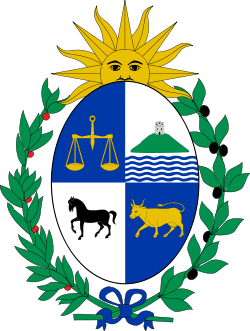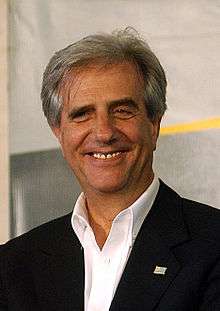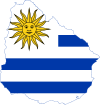President of Uruguay
| President of the Eastern Republic of Uruguay | |
|---|---|
|
Coat of arms of Uruguay | |
| Residence | Residencia de Suarez |
| Appointer | Popular election |
| Term length | Five years, not renewable immediately |
| Inaugural holder | Fructuoso Rivera |
| Formation | 6 November 1830 |
| Website | presidencia.gub.uy |
 |
| This article is part of a series on the politics and government of Uruguay |
|
Legislative |
|
| Foreign relations |
|
See also |
The President of the Eastern Republic of Uruguay (Spanish: Presidente de la República Oriental del Uruguay) is the head of state of Uruguay. His or her rights are determined in the Constitution of Uruguay. Conforms with the Secretariat of the Presidency, the Council of Ministers and the Director of the Office of Planning and Budget, the executive branch. In case of absence, his office is exercised by the Vice President. In turn, the President of the Republic is the Commander in Chief of the Armed forces.
According to the current Constitution, the President is elected direct popular election for a term of five years. He may be reelected any number of times, but is ineligible for immediate reelection. The President and Vice President run on a single ticket submitted by their party. In case no candidate obtains an absolute majority of votes (50.1%), a runoff is held between the top two candidates. In this case, the candidate who obtains a plurality in the runoff wins the election.
According to Article 168 of the Constitution, the President, acting with the respective minister or ministers, or the Council of Ministers, includes, is assigned:
- The preservation of order and tranquility within and security without.
- The command of all armed forces.
- The promulgation of all laws, issuing special regulations necessary for its implementation.
- The delivery, to the General Assembly of Uruguay at the opening of regular sessions, the state of the Republic address.
- The right to veto laws it dislikes.
- The right to propose bills or amendments to laws previously enacted.
- The dismissal of public employees for misfeasance, malfeasance or nonfeasance.
- Management of diplomatic relations and, with consent of the legislature, the right to declare war.
- The right to declare a state of emergency when needed.
- The preparation of the state budget.
- Negotiation of treaties with the ratification of the legislature.
Since 1990, the President's term has begun and ended on March 1. The current President is Tabaré Vásquez.
Latest election
| Party or coalition Presidential candidate |
First round (General election) | Second round (Presidential runoff) | |||||||
|---|---|---|---|---|---|---|---|---|---|
| Votes | % | Seats | |||||||
| Chamber | +/– | Senate | +/– | Votes | % | ||||
| Broad Front Tabaré Vázquez |
1,134,187 | 49.45 | 50 | 0 | 15 | –1 | 1,226,105 | 56.63 | |
| National Party Luis Alberto Lacalle Pou |
732,601 | 31.94 | 32 | +2 | 10 | +1 | 939,074 | 43.37 | |
| Colorado Party Pedro Bordaberry |
305,699 | 13.33 | 13 | –4 | 4 | –1 | |||
| Independent Party Pablo Mieres |
73,379 | 3.20 | 3 | +1 | 1 | +1 | |||
| Popular Assembly Gonzalo Abella |
26,869 | 1.17 | 1 | +1 | 0 | 0 | |||
| Partido Ecologista Radical Intransigente César Vega |
17,835 | 0.78 | 0 | N/A | 0 | N/A | |||
| Workers' Party Rafael Fernández |
3,218 | 0.14 | 0 | N/A | 0 | N/A | |||
| Total | 2,372,117 | 100 | 99 | 0 | 30 | 0 | 2,321,230 | 100 | |
| Invalid/blank votes | 78,329 | – | – | – | – | – | 156,051 | – | |
| Registered voters/turnout | 2,620,791 | 90.51 | – | – | – | – | 2,620,791 | 88.57 | |
| Source: Corte Electoral, Buenos Aires Herald | |||||||||

